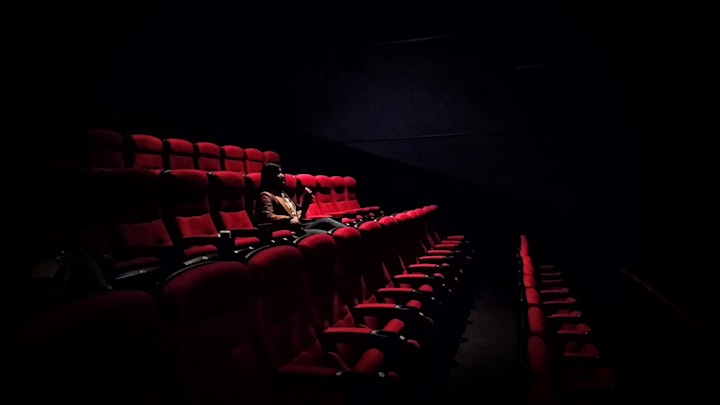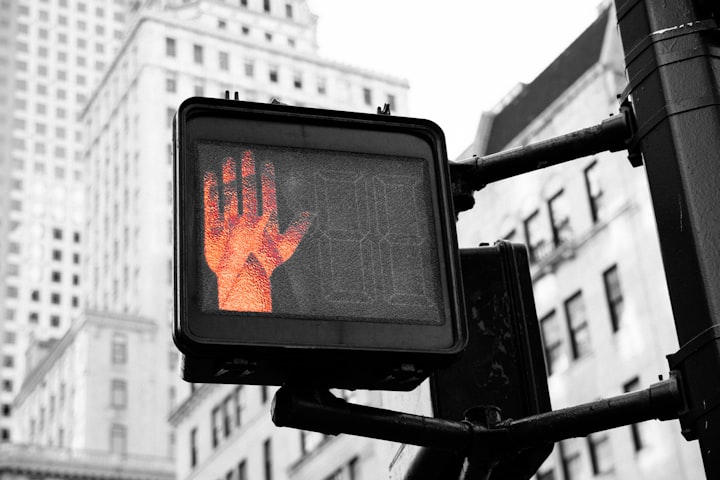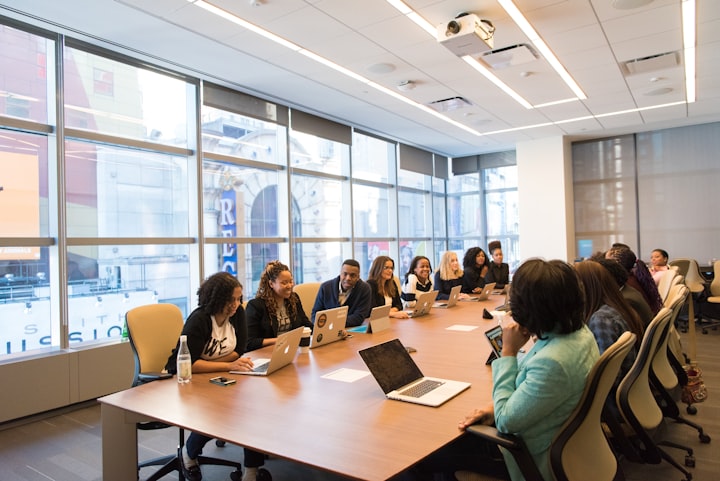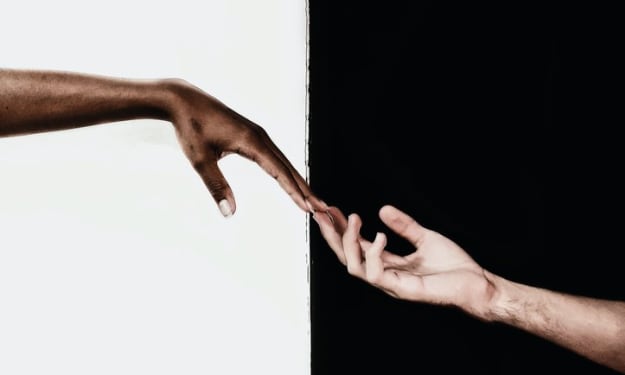My dreams for the theatre in 2021 and beyond
Thoughts on how arts organizations, artists, and audiences can make our industry better.

This dumpster fire year is almost over. Hooray!
Among the many unpleasant realizations we've had to digest this year, for theatremakers one of the worst is that our industry is, well, a mess. An inequitable, abusive, elitist mess.
OUCH. How did something we love so deeply get like this? Largely, it was by standards set early on that go against everything we purport believe about what makes good art, and many of us (including myself) accepting that "that's just the way it is."
Before I continue, I do not look at the above statement about the theatre industry as a condemnation of what we have in fact accomplished. Many beautiful things have been created, many good people exist, and many possibilities are in front of us. These two beliefs I have are not mutually exclusive. We just need to focus on doing away with the mess so we can make things more beautiful.
In a sea of changes we must make as an industry, fairness, safety, accessibility, equity, and innovation must be at the forefront. If you're a theatremaker reading this, take off your defensive cap, read, absorb, and think about the statements below. You don't have to agree with me. But it's all worth thinking about, and I'm far from the only person who has said these things.
I want to say a big thank you to the many folx who contributed to this article, talked with me throughout the year, let me vent, wrote amazing pieces to help me learn, and utilized their expertise in order to mobilize the change we need. I most certainly did not come up with this by myself.
Here are my dreams for what happens in the theatre industry next year and in the many years after. It's a list of reminders as much for me as a theatre leader as it is for anyone else. Working together, we can make theatre the universally joyous industry it is meant to be.
Cancel elitism.

I don't care much for "cancel culture." In our industry and beyond, we need to learn the difference between calling in and calling out, both of which have their place. If people and/or organizations take steps to work toward fixing issues and repairing harm, and the situations improve, then it is possible to move forward.
But a couple of things do nothing but harm, and until they are gone, nothing can be repaired. One is elitism. Cancel it. Cancel the perception (which all white-led organizations have helped build) that theatre is only for rich, white people. Cancel the view that internally percolates at certain arts organizations that it is the audience's privilege to see their brilliant work. (Newsflash: It's your privilege to have them there.) Cancel the idea that the organizations with the largest budgets are better, smarter, and should be the ultimate goal for everyone. And cancel the antiquated idea that large, fancy, and expensive always trumps small, innovative, and lower-cost.
My dream: We will no longer hear that things are "world-class." (What does that even mean? And who decides that? Oh right.) Hyperbolic categorizing like "the best" and "the top" will fade into the background, replaced by terms like "my favorite" and "a really enjoyable/fun/exciting/outstanding experience." We will discuss the art on its own terms, not in comparison to other work. This is for organizations, audiences, and critics alike. It helps to reduce elitism because the experiences that often receive those exaggerated accolades are also the places that are the most expensive to attend. Meanwhile, small theatres do extraordinary work but don't have the marketing budget to reach thousands of people. (This does not necessarily mean that small or mid-size companies are not savvy with their money. Cancel that notion too, please. Oh and please cancel "I've never heard of you." GOD that's so rude.)
Anyway, before you say something is "the best," ask yourself: Have you seen literally everything? Then you don't know what the best is. Believe you've seen everything "worth seeing?" You're part of the problem. Art is nothing if not subjective.
This does not mean that you shouldn't honor great work, wherever you see it! Large, mid-size, and small theatres are all doing great work! Celebrate it! Talk about it! Tell your friends! Write good reviews! All of this helps theatres stay alive and attract audiences.
Along with this, my dream is that audiences won't assume that the productions in the fanciest building with the highest production values, most expensive tickets, and most impressively-credentialed casts are the only work worth seeing.
That's the longest one, I promise.
Cancel abusers.

There is no room anywhere for people who sexually, verbally, emotionally, physically, or otherwise abuse the people they are working with. Disagreements and unintentional harm are bound to occur, which is why we have implemented a Path to Resolution system in the theatre I run.
But some things are just abuse. It happens sickeningly often. I can't even link to something because there are too many instances. Google "abuse in theatre" and plenty of articles will come up. Those are the reported cases. Many go unreported because the victim is afraid of retaliation, which is a sad but extremely valid concern given how far organizations have gone to protect these perpetrators.
My dream: Organizational leadership and boards will implement clear policies on what is acceptable and how abuses will be dealt with. These policies will be reviewed verbally with staff, board, employees, and contractors. (This improves a lot of things, in fact.) Abusers may pop up regardless, but they will not be given a second chance. People will use their critical thinking skills to determine whether harm is done unintentionally or if it is direct, manipulative, and purposeful. Abusers will be shown the door and have it locked behind them.
Cancel all biases. Stop excusing sexism, racism, xenophobia, ableism, fatphobia, etc. in the stories we tell.

This is, of course, going to take a lot more time and complexity because biases are heavily baked into society and are often at their worst in the theatre industry. But we must address it as leaders, artists, board members, journalists, and audiences. How many times have we heard stories and productions excused in the name of the time they were written in, the ultimate message, the strength of the performances, etc.? Enough. There are too many other great pieces already published, and others being written every day. Quit excusing the pieces that flagrantly commit these offenses without ever having to answer for them. Need a marketing plan for those shows no one's heard of? I'm a literal expert. Send me an e-mail.
My dream: The theatre will not be a place where people will have to brace themselves for something uncomfortable, dated, or downright discriminatory without it being a key plot point that is addressed in a meaningful way. If you are performing a piece that addresses these sensitive topics, the artists telling the story will be those who have personal experience with the issue. Additionally, education and outreach activities will take place in which audiences can engage on the topic.
More writing, performing, and directing by and for womxn, BBIPOC, LGBTQIA+ individuals, and differently-abled artists, and all of the intersections of those identities.

If we're going to call out and deal with the issues that plague our society in the name of anti-racism and inclusivity, the artists at the helm and on the stage (or Zoom screen or wherever) should have life experiences that inform the material. In addition, let's just SHOW people onstage and in the media that are going about life and dealing with struggles or triumphs not related to their identity.
My dream: Different, unusual, and provocative pieces will be chosen. Those involved in the process who do not fit the identities portrayed should be supportive, listen, ask collaborative (not defensive) questions, and be ready to set aside their own biases, allowing the work to shine from a point of view that is reflective of the piece's intentions. (And for crying out loud, white people playing other races is 110% not okay.)
The white members of organizations, including senior management, should be involved in anti-racism work.

I have seen too many "diversity and inclusion" committees created that contain all BBIPOC individuals, while Artistic and Executive Management go about their business believing they have done "the work." That defeats the purpose. While members of these identities can help us understand where we went wrong, it's not their job to prescribe how to fix our mistakes, especially if they're not truly in any position to make changes. It's our job (the "our" meaning white people) to figure it out, or it is fruitless. This terrific piece in American Theatre by Michael J. Bobbit of New Repertory Theatre says it all. Performative wokeness is not helpful to the cause. And if we really want things to get better, we need BBIPOC artists hired in positions to make big decisions and cultivate real change.
My dream: The white members of our organizations will spend their time on this. We'll take anti-racism training. We'll engage with people. We'll seek out and eagerly receive BBIPOC wishing to be leaders. We'll listen and receive criticism. We'll read. A lot. Not just the suggested literature, but anything we can get our hands on that deals with anti-racism. We will always do this as part of our ongoing job responsibilities in perpetuity. If we don't understand something, we will look it up. It's not the responsibility of BBIPOC to educate us, but some very much want to have discussions. Some don't. We will all remember to ask if it's okay to ask, and will not answer defensively if the response challenges us for our privileged outlooks. We will always thank them for the emotional labor they expend to help us understand. And most importantly, as white leaders, we will look for ways to hand the mic over to our BBIPOC colleagues.
There are good white leaders out there. I consider myself one of them in that I have made many mistakes, but I go back, weigh what I could have done better, and move forward with a better understanding of how to improve. I apologize when I mess up. I reflect and make plans to do better. I am by no means perfect. But I'm trying. We will all try harder and we will all make it our job to be better, not performatively, but in true, measurable steps.
In a time when white leaders must reckon with our contributions to the white supremacy of arts organizations, we will all be involved in fixing it. It's uncomfortable. It's hard. We'll cry (alone, please). We'll feel guilty. We'll want to atone. The chance is here. We will see this as the opportunity it is to meet, learn from, and make art with amazing people.
More innovation.

Arts leaders have been trying to solve the problem of reaching more people for years. The pandemic took so much from us, but I believe it gave us the gift of learning how to get our work TO people, rather than convincing them to come to us. After we got over our initial shock, remarkable ideas came to the forefront. People did online readings, danced in parking lots, did plays in drive-in theatres, performed from their closets, created podcasts, made films, sang from balconies, played accompaniment for online sing-a-longs, broadcast from driveways, and so so so much more. This shouldn't stop after the pandemic. It was too good to lose. It made us stronger. It tapped into our creativity in ways that created real beauty.
My dream: Seasons will consist of traditional theatre experiences. They will also feature content that gets out to people in non-traditional, less expensive ways. There will be a cycle of giving and receiving between ourselves and our audiences. We will not take one single patron for granted.
More use of local talent.

Here we come back to elitism. Talent is not dictated by zip code. Are there a lot of talented folx in New York, Los Angeles, Chicago, and other larger areas? Of course! Are those the only places where talent exists? No. The sooner we quit using people's city of residence as an indication of their talent, the more our audiences will be on board with the "buy local" mentality for arts organizations. This is not to say theatres cannot bring in talent from out of town. But mix it up. Let people see what your locale has to offer. Don't contribute to the concept that anyone who is "good enough" left for "the big city." It's harmful and inaccurate.
Incidentally, while training is wonderful, not everyone can afford it. Top theatre programs are extremely expensive. A lot of people with gifts cannot go this route, or choose not to. So while no one should be ashamed of their training, assuming someone does not have talent or discipline simply because they do not possess the training is classist.
My dream: Local artists will be considered and accommodated for professional work. Equity status, while great and very important, will not be a primary indicator of talent. Directors and others will take time to learn different ways of working, and will adjust the "standard" rehearsal and work schedule to accommodate people with jobs, children, and obligations that do not allow them to drop everything for their acting job.
Accessibility: Financial

"We must reach the disenfranchised in our communities! That'll be $100 plus fees." I'm sick and tired of these sentences being uttered in the same paragraph. If we want to reach the disenfranchised, we need an understanding of who these disenfranchised people are that we want to reach, what they want to see, and how much they are willing and able to pay. This is one of the more hypocritical attempts to be "woke." Price matters**.
**Accessible does not mean free. Far too many funders and audiences are expecting arts organizations to create their work for free. It's been going on for years. It's not okay. Furthermore, the pandemic has made this worse. For a few months we all rallied to support other causes using our platforms. But that was before we knew this thing was going to continue for too long.
I get that figuring this out is really, really tough. I get that expenses have to be paid and salaries need to be fair and sometimes funders can't support lower ticket costs and it's a vicious cycle. But we have to see the problem before we can begin to address it. We may have to throw some things at the wall to see what sticks. Take (literally) calculated risks. It is hard and trust me, I respect that.
My dream: There will be tiered pricing, pay-what-you-can nights, streaming days, talkbacks, and additional benefits to our more expensive shows. Outreach activities and supplemental experiences will add to our events and outputs. We will do research amongst our communities to understand how we can be more financially accessible. We will get more people into the theatre.
Accessibility: For the differently-abled

Our online content and in-house experiences must be accessible for disabled patrons to experience and enjoy. I must admit, I am catching up here too, even as a differently-abled person myself. But it goes back to making sure that more people can participate in and enjoy our work.
My dream: Reserved wheelchair seating, reserved seats ahead of time for those who cannot climb stairs (organized with the house manager), image descriptions below things we post on social media, captioning or ASL for performances and online content, allowance for people to move or get up mid-show if they need to (and no shaming those that do), clear signage, and more.
No pay-to-play work.

These programs are hopefully on their way out. For too long the "climbing the ladder mentality" has ended with a ladder that leads nowhere. These programs are elitist, they take advantage of people who want to build their careers, and they demean artists by monopolizing their time while paying them nothing or actually charging them to be part of the programs.
Like anything, there are layers to this, but it's pretty easy to see what's exploitative.
My dream: Theatres will hire the best person for the role. In the case of an apprenticeship, artists will be paid proportionately to the amount of time they are working. If we can't pay a full-time wage, we can't expect full-time hours. If providing an educational experience, theatres will make sure there are beneficial learning opportunities in accordance with their mission. For those pursuing professional work, these learning opportunities will have job prospects, school credit, letters of recommendation, and fair and equitable treatment from the company. Those doing apprenticeships or internships will not be asked to do free labor they're not trained or qualified for such as building sets (unless they are in a corresponding apprenticeship), cleaning the theatre (get a janitor), or doing coffee runs (come on). Furthermore, BBIPOC in these internships will not be tokenized and exploited.
JOY

Okay, I've gone through a lot of issues. If you made it this far, you really believe in what we can accomplish as theatremakers. So my ultimate dream is this:
All artists will feel JOY. They will look forward to rehearsals and performances, feel their needs are met, feel they are doing important things for audiences that appreciate them, know that the administrators behind them have their best interests at heart, feel fairly compensated for their time and energy, and can get out there and make beautiful, powerful work, whether it be in a church basement or a giant concert hall. They will know that they are important, that their work matters, and that their talent is appreciated.
With that, audiences will receive the best of our creativity and passion with experiences that are accessible to all. We will engage with our audiences and include them in the cycle of making amazing things happen. We will thank them for being part of the experience, listen to their feedback, and continually look to make sure we are reaching more diverse people in every possible way. Everyone deserves something beautiful. Something powerful. Something that will stir their emotions. We have that ability.
At the end of the day, we have the power, at every level, to feel and cultivate JOY. So let's work on getting the messy stuff fixed, the inexcusable stuff gone, and the improvements implemented. Let's make theatre a place of JOY.
Look, I'm not claiming to have all the answers. I don't. You don't either. But what if we confronted the problems and really started working together? What if we saw all of this as an opportunity to bring our love for this industry out into the world?
Nix the mess. Bring the beauty. I'm ready. Let's do this.
Meghan Randolph is the Executive Director of Music Theatre of Madison, a 15-year-old professional theatre in Madison, Wisconsin. The company focuses on new and lesser-known works of musical theatre and the genre's potential to provoke, engage, and unify audiences. She holds a BFA in musical theatre from the University of Michigan and an MS in Arts Administration from Drexel University. She is a published writer on marketing lesser-known works and has spoken on the topic at national conferences. Meghan is also founder and director of the Voices Theatre, a company dedicated to producing readings illustrating populations that have been systemically silenced, with proceeds given to local charities. Meghan has been working in theatre for over 30 years and has worn the hats of performer, director, producer, educator, choreographer, and costume designer. She loves to learn from different experiences and constructively engage on arts-related topics. Learn more and contact her at www.mtmadison.com.






Comments
There are no comments for this story
Be the first to respond and start the conversation.